June 2, 2003 - Maryland Returned Volunteers: Returned Volunteers honor former Director Jack Vaughn
Peace Corps Online:
Peace Corps News:
Special Reports:
November 16, 2004: UMBC's Shriver Center and Maryland Returned Volunteers welcome Scott Stossel in 2nd annual "Peace Corps History" series:
Sargent Shriver and the Birth of the Peace Corps :
June 2, 2003 - Maryland Returned Volunteers: Returned Volunteers honor former Director Jack Vaughn
 | The Birth of the Peace Corps
UMBC's Shriver Center and the Maryland Returned Volunteers hosted Scott Stossel, biographer of Sargent Shriver, who spoke on the Birth of the Peace Corps. This is the second annual Peace Corps History series - last year's speaker was Peace Corps Director Jack Vaughn. |
Returned Volunteers honor former Director Jack Vaughn
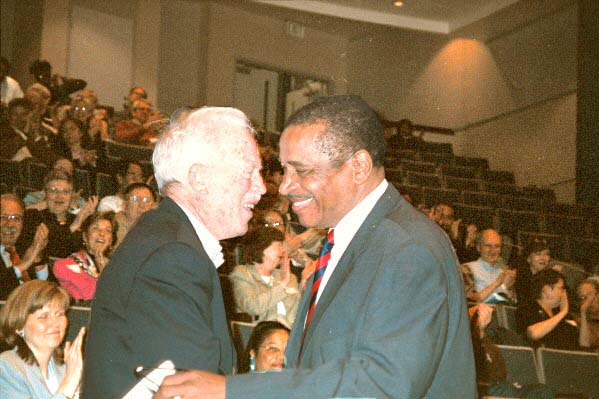
Read and comment on this story from the Maryland Returned Volunteers on the event they organized with the Shriver Center in Baltimore on May 4 to honor former Peace Corps Director Jack Vaughn at the University of Maryland at:
Returned Volunteers honor former Director Jack Vaughn*
* This link was active on the date it was posted. PCOL is not responsible for broken links which may have changed.
Returned Volunteers honor former Director Jack Vaughn
On Sunday, May 4, the Maryland Returned Volunteers and the Shriver Center sponsored a special event at the University of Maryland to honor former Peace Corps Director Jack Vaughn.
The event consisted of three parts:First a photo exhibition and advocacy fair starting at 3 pm held in the atrium of the Computer Science and Engineering Building at the University of Maryland's Baltimore County campus.
Next a special program including an award ceremony and speech by the former Director in the Main Auditorium of the Computer Science and Engineering Building from 4 to 530 pm.
Finally a reception for Director Vaughn that went from 530 to 7 pm.
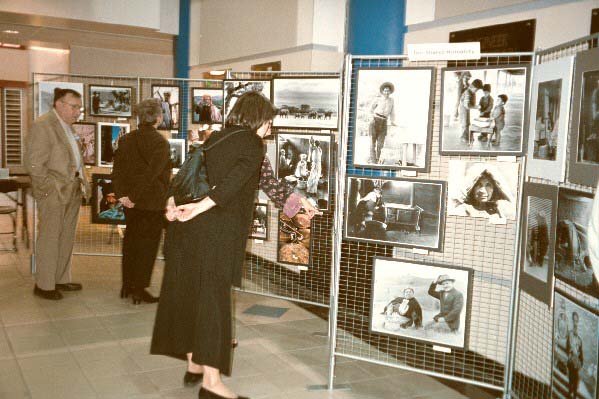
The Peace Corps Photo Exhibition
Returned Chile Volunteer Kay Muldoon-Ibrahim put on a photo exhibition of her many photos over her 30 year career as a photo-journalist photos selected for this exhibit to illustrate her major goal as a photographer - "Our Shared Humanity." The photos were all taken in countries where volunteers have served: Chile, Guatemala, Peru, Kenya, Ethiopia, Ghana, Ivory Coast, Morocco, Afghanistan, Iran, Pakistan, and Yemen. Ms. Muldoon-Ibrahim got her start in photo-journalism working for Peace Corps Washington in their Department of Public Information and in that capacity shot some stories for the "Peace Corps Volunteer" Magazine in 1968-1969.
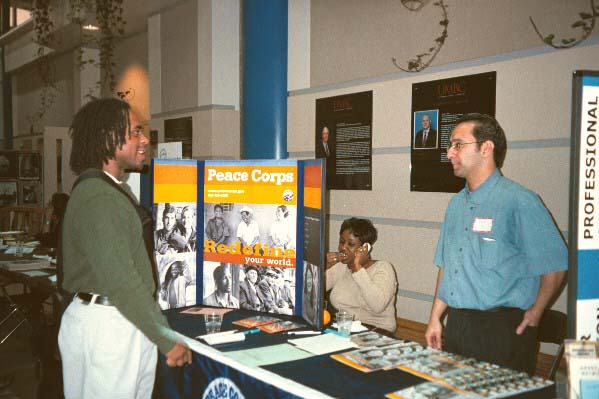
The Peace Corps Recruitment Table
Meanwhile the Peace Corps' mid-Atlantic Recruiting Office out of Arlington, Virginia put up a recruitment booth where they talked to prospective volunteers. Lynn Kneedler, the head of the recruiting office, had issued invitations to prospective volunteers and others interested in joining the Peace Corps to attend the event.
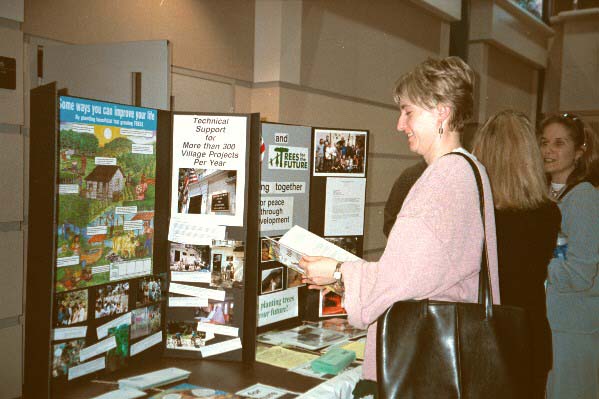
The Advocacy Fair
There were eight groups represented at the Advocacy Fair including Maryland Returned Volunteers, the Shriver Center, the National Peace Corps Association (NPCA), the Global Warming Alliance, the Peace Corps Fund, Keeping Kennedy's Promise. Trees for the Future, and Peace Corps Online.
Trees for the Future
Trees for the Future (above) supports community projects that plant fast growing, permanent beneficial trees. These trees restore our environment, improve agricultural productivity and provide economic benefits to people in developing countries. The projects not only restore deforested areas, they help bring back the livelihood, health and harmony of the people who need and use these lands. Support the tree planting projects around the world. Requests to start projects are received daily and they need your tax deductible contribution to continue this life saving program.
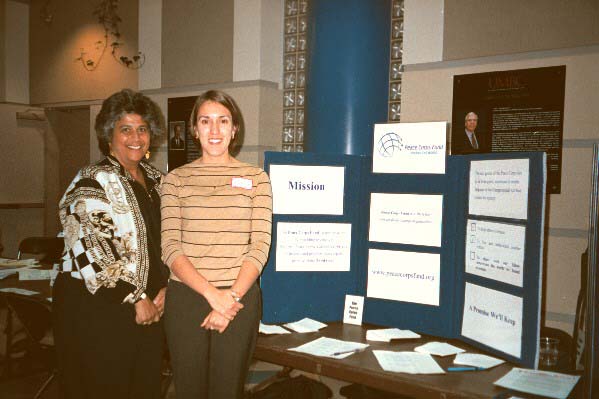
The Peace Corps Fund
Morocco RPCV Barbara Ferris (above, left), Founder and President of the Independent Women's Democracy Fund, is shown at her booth promoting the Peace Corps Fund with Alison Blosser, a Program Associate for the Center for Civil Society and Governance. The Peace Corps Fund was founded to support programs, projects and activities conducted by Returned Peace Corps Volunteers to implement the Third Goal of the Peace Corps Act - helping Americans understand the people and cultures of other countries - and thereby making our country better informed and more engaged in world affairs.
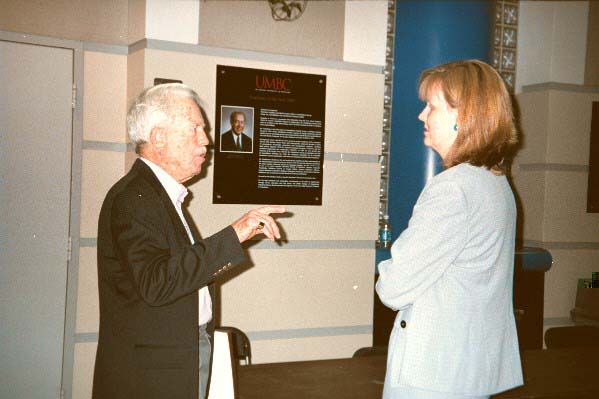
Welcome from Maryland Returned Volunteers and the Shriver Center
The main program began in the auditorium as Hugh Pickens, Vice President of the Maryland Returned Volunteers, welcomed everyone on behalf of the Maryland Returned Volunteers, the Shriver Center, and Peace Corps Online and introduced Summer Rosswog (above, right) who talked about the Shriver Center and welcomed the group on behalf of the Shriver Peaceworker Fellows Program to UMBC and said how pleased the Shriver Center was to co-host this event.
Summer talked about the history of the Peaceworker Program and how it was established by Tim Shriver in honor of Sargent Shriver on his 70th birthday and how it is a graduate program to educate leaders in promoting peace and social justice, the lifelong work of Shriver. The program was formed at the same time (1985) as the formation of Peace Corps Fellows/USA . It is separate from the Peace Corps Fellows but shares the 3rd Goal of Peace Corps: "To strengthen Americans' understanding of the world and its peoples - to bring the world back home."
"Peace" comes from Peace Corps and Sargent Shriver's broader idea of building lasting structures of peace at home and abroad. "Worker" comes from the pacifist communitarian Catholic Worker Movement of Dorothy Day and Peter Maurin, achieving social change through service and activism.
The Peaceworker Program is unique among the various Fellows/USA programs because of its interdisciplinary cohort structure. Weekly, first and second year Peaceworkers (approximately 16 total) participate in and lead ethical reflection sessions that tie their service, individual studies, and issues of social justice, leadership, and non-violence together. Not only does this and other cohort activities produce more astute graduate students and community leaders, but reflecting and acting as a cohort creates a Peaceworker network of service and activism that extends beyond graduation-a lasting structure of peace in and of itself.

Introduction of Jack Vaughn by C. Payne Lucas of Africare
Thirty years ago C. Payne Lucas co-authored a book, "Keeping Kennedy's Promise, that many regard as the best book ever written about the history of the Peace Corps - a history that contains a critical appraisal of the decisions that were made during the early days of the Peace Corps that have guided the agency ever since. C. Payne recently retired as President of Africare where he worked for 30 years. Before that he was one of the first Peace Corps Country Directors and later head of the Africa Region at Peace Corps Headquarters. He introduced and talked about his friend and colleague for the past 40 years, Jack Vaughn:
Jack Hood Vaughn was born in Columbus, Montana in 1920, the son of Elijah H. (L.H. for short) and Blair (Cox) Vaughn. He attended the Albion Public Schools and graduated from Albion High School in 1939. While as a youth, Jack became interested in the sport of boxing, since his first name was the same as the famous boxer Jack Dempsey. Jack would spar with area boxers on the third floor of his father's building where a makeshift gymnasium was located. Jack won the Golden Gloves state championship, and for many years made his living as a professional boxer. He later served as the head boxing coach at the University of Michigan.
Internationally, Jack is most well known for being the second Director of the Peace Corps, beginning in 1966. In addition, he was U.S. Ambassador to Panama and Columbia, and the president of Planned Parenthood for many years. Other credits include director of the foreign language programs of Sesame Street, Assistant Secretary of State for Inter-American Development Institute, U.S. Coordinator of the Alliance for Progress, and President of the Pierce Energy Corporation.
Jack currently lives in Tucson, Arizona and at 82 is definitely not retired, but is active as ever after a lifetime of exemplary public service. His calling card states, "Writer, consultant, environmentalist, and more things than you can shake a stick at." He currently is chairman of ECOTRUST in Portland, Oregon and travels to Central America several times a year.
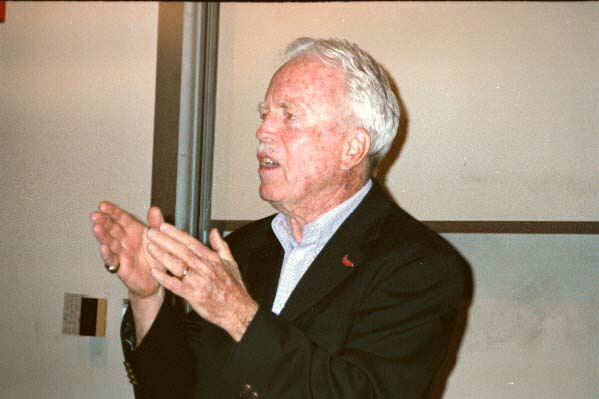
Excerpts from the Talk by Jack Vaughn
Following are excerpts from Jack Vaughn's talk. We will be publishing further excerpts in future issues of Peace Corps Online.
Development and Bureaucracy
Before I start I would like to give credit to the great book that Kevin Lowther and C. Payne Lucas did called "Keeping Kennedy's Promise." If I was giving advice to someone going out as a volunteer or as a staff member today, I would say - read "Keeping Kennedy's Promise" - because all the lessons are there.
The other credit is to someone you may not know - my guiding star - Peter Drucker - the leading management authority of the last century and the most unbelievably intelligent person I ever met. But he has written a book- "The New Realities" and the realities are newer today than they were in 1989 when he wrote the book.
Drucker has focused for a long time on development: How do we today as the world's richest and largest country help our friends around the world? We now know that development is not easy - we know that it is not fast - we know that it first makes poverty more visible and harder to accept - we know that it means hard work. We know that its foundations are education and competence rather than capital investment. We know that development cannot be given - it must be achieved. We know that for development to occur, there has to be a foundation.
This is a situation where there is a tendency to be a bit cynical - C. Payne Lucas and I have seen it all - the efforts to transfer technology abroad. And the truth is that overall, we haven't done too well. We had a great success in the Marshall Plan; under FDR there was a Good Neighbor policy headed by Nelson Rockefeller - and then a Point 4 program. And finally we had a monstrous bureaucracy called USAID. We were saved at the start in the Peace Corps by not being a part of USAID which would have ended it - we would not have got out of the starting blocks.
Because even though we are working with underdeveloped countries, these countries have enormous bureaucracies themselves. Can you imagine AID going to Liberia and you have this huge gringo bureaucracy and a huge local bureaucracy which basically does nothing but provide employment? It would be like two hippos with severe arthritis trying to make love - it doesn't work well.
So where does that leave the Peace Corps? The Peace Corps is not a part of AID because we are not a bureaucracy - if we were we would be dead in the water. Jack Kennedy wanted to consolidate all of foreign aid - and he pushed very hard to make Peace Corps part of USAID and if that had happened Peace Corps would have been stillborn. We are the boogie woogie man of USAID. We are out there keeping people honest.
What works in Development
Over the years we have learned some things - what works and what doesn't work in development. And we have learned that what works - what the world needs desperately is campaigns. Campaigns win wars. Campaigns get people elected. Without campaigns you cannot magnify the individual volunteer effort. It is the core. You've got to have a campaign. If it is not a campaign it will not work to transfer technology. The joy of the Peace Corps is that we have learned after 40 years that it can be perpetuated - you can have campaign after campaign after campaign.
And there is one example that can't be denied and it happened in UNICEF. I personally have a very low opinion of United Nations special agencies - because they are such big bureaucracies. But there is one exception - and that was done by Jim Grant who was the head of UNICEF. He was concerned by the unwarranted, outrageous deaths of infants worldwide from diarrhea.
There was a little deal called oral rehydration salts - that could keep kids from dying. And he used to save 3 or 4 million infants a year. The slogan of the campaign was "walk for diarrhea" - I told him to change it to "quickstep for diarrhea". Even though it was United Nations - they used a campaign to get things done. If that doesn't happen - accelerated development in the third world just won't happen.
Two or three years ago there was a special report from the United Nations on what caused the Third world to stay stagnant and not become part of the second world. What they found was that it was Bad Government. The report cost $20 million. I don't know a Peace Corps volunteer who couldn't have told them that after the end of the first month in country. They could have saved the United Nations $20M.
Of course there are other things - Bad Justice, and Bad Education. If I were Jack Kennedy starting the Alliance for Progress in 1961 again, my total thrust would have been reform in these areas.
What makes a Volunteer Successful?
I had a wonderful experience 12 years ago. I was on the committee to select 20 new mid-level USAID executives out of 60 candidates. We made the selection and it turned out that all 20 were former Peace Corps volunteers. This really got my attention. We had one more session - I said I'd like to have an hour more with the members of the selection committee. The members of the committee were all stars - Ph.d's, Phi Beta Kappa, MBA's and I asked them what made the Peace Corps volunteers special?
They said that the former Peace Corps volunteers were more mature, they were broad gauge, they seemed to have more interests that revolved around people and not around statistics, and they spoke the language.
You know one of the big problems that we had in the early Peace Corps was that we didn't give enough emphasis to language. We started out with a requirement of 50 hours of language and if you are going to be a community development type - you have to be able to talk to the people. You are ready to go out and conquer the world and you find yourself limited to saying things like "My grandpa's viagra pill is on top of granny's pillow" and not much more. That really wasn't fair - with a little pushing we pushed it to 150 hours and what we really needed was 300 hours.
But how do you know that you are selecting the right people to join the Peace Corps. How do you select the successful volunteers. And we would fake it. This was a question that I used to pose to the head of selection at the Peace Corps who was the head of the Psychiatry Department at the University of Michigan. And we never did know.
Charlie Peters was the head of evaluation at the Peace Corps and he went on to found the "Washington Monthly" magazine after he left the Peace Corps at the end of his 5 year tour. Just before Charlie Peters left the Peace Corps he came to me and said the we have done a little secret experiment to try to find out what makes a successful volunteer and more importantly see how you can tell if you have selected the right volunteer to send.
Here is what he found. He had 600 highly successful volunteers who were rated by peers, leaders, trainers, everybody graded these volunteers as successful or outstanding in some way. Then we had 600 failures - people who didn't get through training, or came home early, or they were just kind of a nuisance. And then the control, a random 600 for a total of 1800 volunteers.
And we went back and tried to find out what made for success in the Peace Corps. And we were brought up short because back in those days we required 12 letters of recommendation to be accepted into training as a Peace Corps volunteer. And when we looked at the volunteers who were a success, the letters of recommendation all looked like they had been written by the same person. And in every case we found the same descriptive adjectives.
And here's what they were. They had nothing to do with the then current feeling of success from "What makes Sammy run?" an aggressive, take charge person. Not at all - it was quite the opposite. The things that were written about the volunteers who were highly successful were almost like the boy scout credo - the volunteer is trustworthy, loyal, helpful, courteous, friendly, kind, cheerful, thrifty, clean, and reverent. But more specifically the successful volunteers are good listeners - he or she is a very good listener. The successful volunteer has a good sense of humor. The successful volunteer is tough and doesn't quit. The successful volunteer is articulate and has a good mind. All these things.
Had we used those criteria the entire selection staff would have walked - which they threatened to do. We never did it but wouldn't it be great to use those criteria to save so much pain, to save so much money, and to get the right people. So I would like to conclude that I hope that all of you will consider joining the Peace Corps or join it again and that all of you get there because you are trustworthy, loyal, and true.
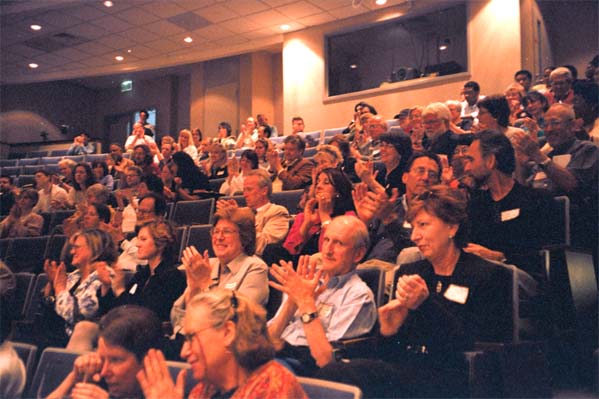
Returned Volunteers honor Jack Vaughn
Returned Volunteers in the audience applaud Director Vaughn at the close of his talk.
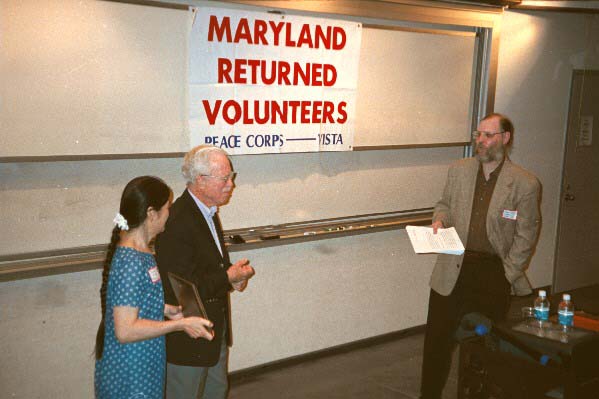
Peace Corps Lifetime Service Award to Jack Vaughn
After the Director's talk, Maryland Returned Volunteers Treasurer JoAnna Allen (above, left), representing the Maryland Returned Volunteers presented the Director with a plaque as Hugh Pickens (above, right) reads the award:Peace Corps Lifetime Service Award
This Award is given to Jack Hood Vaughn as one of the men who shaped the United States Peace Corps to honor him for a lifetime of exemplary public service that does honor to the ideals of the Peace Corps. This award is given on May 4, 2003 at the UMBC Campus on behalf of Peace Corps Online and the Maryland Returned Volunteers.
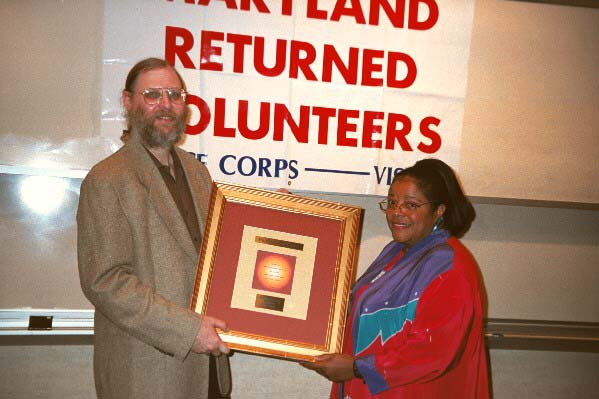
Award to Peace Corps Online
Then the Maryland Returned Volunteers presented a special award to "Peace Corps Online." Their award read:Peace Corps Online
Do not go
where the path may lead.
go instead
where there is no path
and leave a trail...
emerson
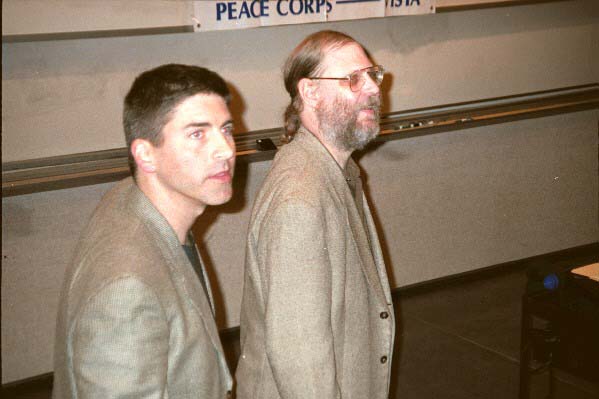
Thanks
The program concluded with Maryland Returned Volunteers' President Brian Dulay (above, left) thanking those who had worked so hard to make the event a success:Joanna Allen, Kay Muldoon-Ibrahim, Summer Rosswog, Christa Bucks Camacho, Joe Navarro, Betty Weitz, Jesse Dubin and Hugh Pickens of the Maryland Returned Volunteers
Peter Antoci and Jennifer Arndt of the Shriver Center
Kevin Lowther and C. Payne Lucas of Africare
Pat Reilly and the National Peace Corps Association
Lynn Kneedler and Jennifer DiBella of the Mid-Atlantic Peace Corps Recruiting Office
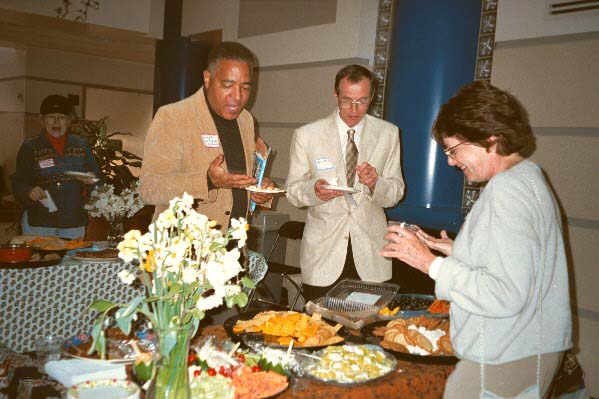
Reception for Jack Vaughn
Maryland State Delegate and RPCV Ken Montague (left) shares a joke with Ken Allen.
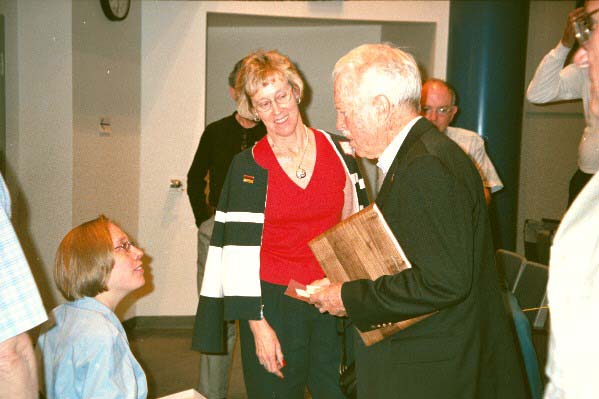
Returned Volunteers talk to Jack Vaughn
Maryland Returned Volunteers' Newsletter Editor Christa Bucks-Camacho (seated) talks to Director Vaughn while her mother, Betsy Bucks, RPCV Colombia stands in the center. The Director stayed until 7 pm until every person there had a chance to talk to him and offer their congratulations.
Click on a link below for more stories on PCOL
5/29/03

Some postings on Peace Corps Online are provided to the individual members of this group without permission of the copyright owner for the non-profit purposes of criticism, comment, education, scholarship, and research under the "Fair Use" provisions of U.S. Government copyright laws and they may not be distributed further without permission of the copyright owner. Peace Corps Online does not vouch for the accuracy of the content of the postings, which is the sole responsibility of the copyright holder.
This story has been posted in the following forums: : Headlines; Peace Corps Directors - Vaughn; USAID; History; NPCA
PCOL5037
28
.
When I served with the Peace Corps in Brazil (Brazil II) 1962-64, Jack Vaughn came to our site at Bom Jesus da Lapa in Bahia and spent the night. All local volunteers had been invited and met with him. At the end of a busy day, Jack, Leo Fanning (our project leader) and I opened a bottle of Scotch (Grants) that I had bought in the village and we relaxed over a nip or two and good conversation. Jack is a nice guy and I will never forget his visit. Jim Murray, St.Paul
Jack came to my barriada home in Mariscal Ramon Castilla in Rimac on the outskirts of Lima, Peru in 1966 or 1967. I can't recall exactly. What I do remember is that we had a relaxed, informal good time talking, drinking and eating with a bunch of other volunteers. After he left we all decided that he had more than filled those big shoes of Sargent Shriver. My Peace Corps experience was the defining moment of my life and has since shaped everything else I've done.
After returning from Tanzania (Tanganyika Vl-1964-66) I worked in Talent Search the staff recruitment arm. On one occasion I have returned from a trip across the country interviewing perspective candidates. I had interviewed a candidate in the Denver airport. However, my gut told me to ask to meet the family so we drove to Greeley. This candidate had not involved the family in this decision, which included two teenage children.
When I forwarded a "thank you but no thank you letter" he wrote his Senator and asked how could the Peace Corps have sent a young inexperienced person to interview a senior executive of Martin Marietta. When the "rush" folder landed on my desk with a note from Jack, I met with him. I explained that as a RPCV who had two APCD's in as many years because spouses and or family were unhappy. I said to Jack, "If you send this person it will be a disservice to Volunteers. This candidate is not PC material." I further requested permission to spend time interviewing family members of serious candidates if there is need. This permission was granted.
Jack asked that I draft a response to the Senator for his signature, which was done. A true team builder.
Earl M. Brown, Jr.
RPCV
CD/ PNG 1992-1994
CD/Guyana 2001- Present
My Brother in law, Sam Brown who was the director of the peace corps under Jimmy Carter, is in tucson and and we would like to contact Mr Vaughn. I can not find a phone number. Can anyone help me?
1962-1964: Sometime in late 1962 or early 1963, Jack Vaughn visited the Peace Corps home of myself and my PCV partners Joe Jaycox, recent recipient of the JFK Award, and Clayton "Tyke" Marshall. He not only was a good Poker player, he also braved swimming in the water around our home on stilts at the end of a boardwalk.This was in Santa Rosa de Agua, on the edge of Lake Maracaibo in Venezuela. We all assumed it was safer at the END of the boardwalk since there were no other sanitary facilities other than a hole on our back porch.
1968 or 1969: A psychologist friend of mine in Whittier, CA, asked me if the Peace Corps hired psychologists on a short term basis. I said yes and called the Peace Corps office and asked to speak to Jack. He came right on the line and told me he had just received a request from the Philippines. My friend called Jack and he was hired within 20 minutes.
1972: Jack visited my home in Chula Vista, CA,and met with the small group of RPCVs in San Diego County.
THANKS FOR EVERYTHING, JACK!














